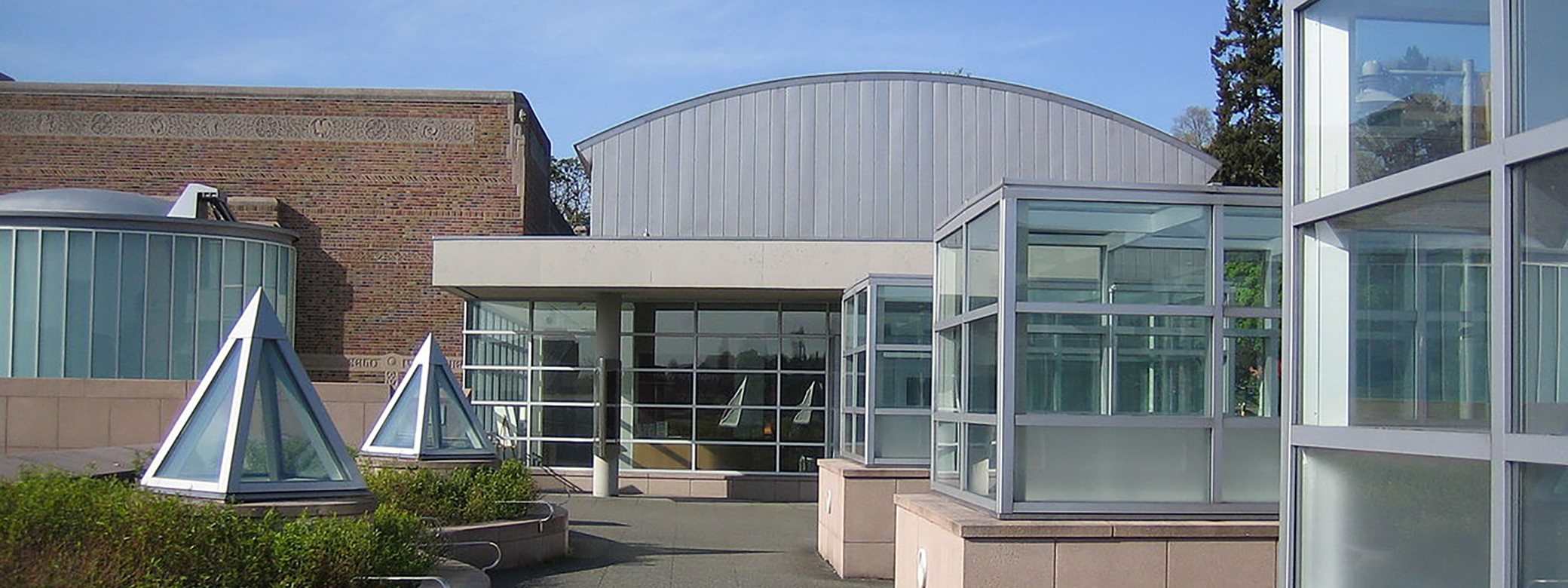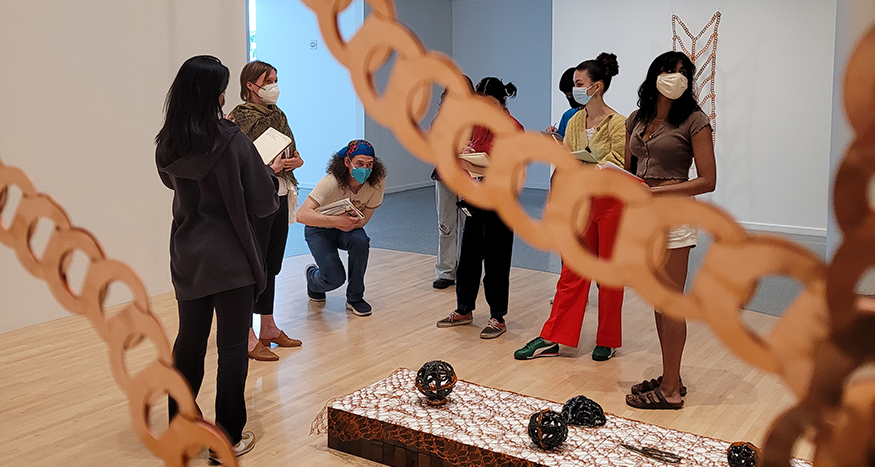
Tour a Henry Art Gallery exhibition with UW senior Em Chan, and you can expect to do more than just look and listen. In addition to providing information about the works on display, Chan will likely share personal reflections on the work — and encourage you to do the same.
Chan, an art history major, offers tours through the Henry Art Liaisons (HAL) program, a year-long internship for UW undergraduates. Launched in 2020, the program builds connections between the Henry and various communities while encouraging students to trust — and share — their unique perspectives on art.
“The idea was to create a program that decentralizes what leading tours looks like,” says Berette S. Macaulay, HAL program manager for the past two years. “That meant encouraging a co-learning environment for the guides and whoever comes on the tours — doing away with the idea of expertise and instead shaping conversations that recognize subjective perspectives and lived experiences.”
Liaisons, Not Guides
The values of the Henry Art Liaisons program are baked into its name. When Macaulay was hired to develop the program, with funding from the Jones Endowed Fund for the Arts, it was originally called the Museum Guide Program. Macaulay wasn’t comfortable referring to the interns as “museum guides,” a title that suggested a more traditional approach. So she asked the interns to brainstorm other possibilities.
[It's] such a gift to get all of these different perspectives on art with the visitors you interact with.
"I offered it as an assignment," says Macaulay, an artist, curator, and writer. "We’d already been looking at the performativity of language in the museum space, so I asked the interns to look at various naming conventions and how they felt about them. They considered common terms — museum guide, docent, student educator — and came up with their own, 'art liaisons,' which they felt better reflected their intention to speak with visitors as equals, learning along with them." Henry leadership supported the name change, with the addition of "Henry" in the title.
For Macaulay, that was an important first step. She had joined the Henry with the understanding that the museum wanted someone to pilot the program who would challenge the status quo. The leadership’s openness to this student-led suggestion demonstrated that commitment.
Immersed in the Arts Community
In its first two years, the HAL program funded 16 interns, with majors ranging from nursing to art history to anthropology. Inviting students with diverse majors was intentional, to infuse the program with varied interests and experiences. Interns receive an honorarium, plus course credit from the School of Art + Art History + Design, the program’s institutional partner.
Many interns had not frequented the Henry before participating. Chan applied as a sophomore after receiving an email about the internship, before ever stepping foot in the museum. “I had been interested in museums and art history in the past, so it sparked something in me,” Chan says of the email. “I was curious to see what opportunities there might be in the museum sphere and the arts sphere.”
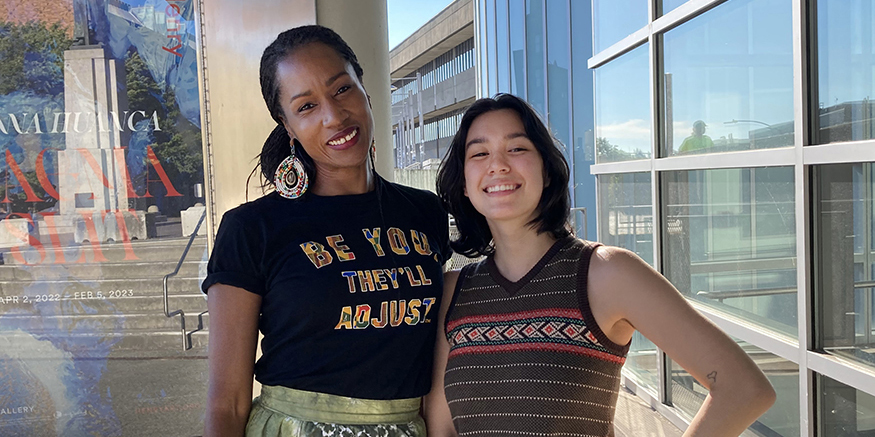
Macaulay developed the program with students like Chan in mind — students interested in the arts but not yet immersed in the arts community. Over three quarters, interns attend weekly “salon” sessions through which they explore the role of museums, including their troubling roots in colonialism. They learn how to read, find, interrogate, and examine art — and to trust their own interpretations. They meet with invited salon guests representing a range of careers in the arts, and they visit other museums and galleries.They hone their speaking skills through a series of short presentations about artists, artworks, or exhibitions of their choice.
“The presentations introduce them to speaking publicly within a time constraint,” explains Macaulay. “They have to condense their ideas, figuring out what’s important to include and what to leave out, while supporting each other in the process.”
Finally, with Macaulay’s mentorship, the interns prepare to nurture ongoing relationships with museum visitors by designing unique tour proposals for current Henry exhibitions and creating and hosting community programs that highlight the Henry’s many resources for its communities. During spring quarter, the students begin offering public tours. Not surprisingly, most find interacting with the public far more challenging than presenting to classmates.
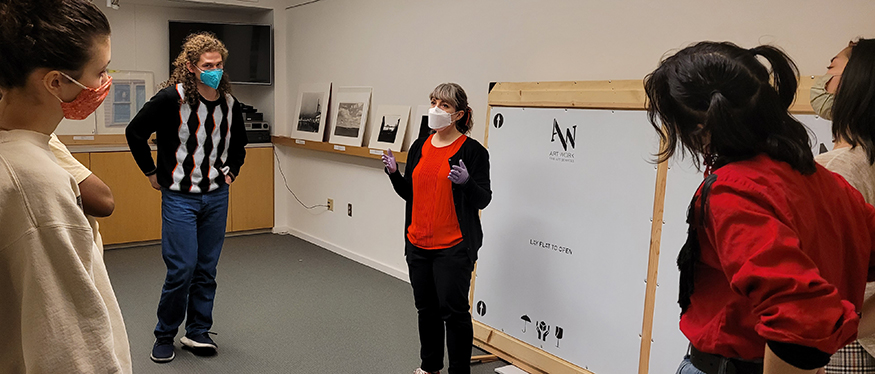
“A lot of my early tours were reminiscent of a traditional museum tour where it’s just giving people a bunch of information, not factoring in their take on it or their questions or their interpretations,” Chan recalls. “I tried to cram all the information that I knew about the exhibit into my tour, and when it headed in a different direction, things went off the rails. I didn’t know how to adjust.”
Chan continued as a HAL intern for a second year. Not only did the tours improve, but their experience of the artwork became far more satisfying. “I learned to lean into the chaos of not knowing how the tour is going to change from day to day, even if it’s the same exhibit, even if I have the same overarching theme that I’m exploring,” Chan says. “Because each tour is a different audience, it’s a bit scary. But it’s also such a gift to get all of these different perspectives on art with the visitors you interact with.”
Looking Ahead
Fortunately for Henry visitors, Chan will continue leading tours through spring 2023. Another continuing HAL, Shreya Balaji, will also lead tours, ensuring plenty of public engagement before the 2022-23 cohort is ready to join them next spring.
Macaulay, who set the tone for the program and guided two years of cohorts, recently left the Henry to pursue her work with Black Cinema Collective and other artistic endeavors. Her interns are thankful to have grown through her guidance.
“I think the most significant thing I’ve gained from this program is understanding that all facets of my identity have a place in what I do at the Henry and in other art spaces,” says Chan, now an intern at Northwest Film Forum and a volunteer at the Wing Luke Museum — opportunities discovered through the HAL program. “There are multitudes of ways to look at something from all the experiences I’ve had. And I’ve come to see that each person I interact with also provides a unique perspective on anything we’re approaching together. As I continue to develop through the HAL program, that realization is something I’m really grateful for.”
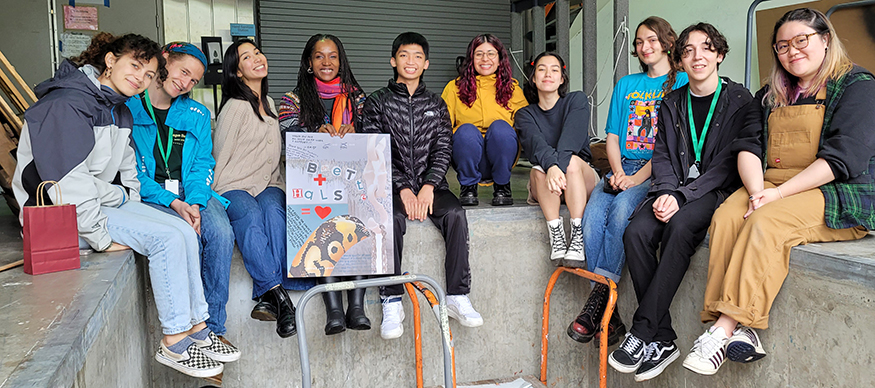
Learn more about the Henry Art Liaisons program, check for upcoming Henry Art Liaisons tours, and follow the HALs on Instagram.
More Stories

AI in the Classroom? For Faculty, It's Complicated
Three College of Arts & Sciences professors discuss the impact of AI on their teaching and on student learning. The consensus? It’s complicated.

What Students Really Think about AI
Arts & Sciences weigh in on their own use of AI and what they see as the benefits and drawbacks of AI use in undergraduate education more broadly.

Bringing Music to Life Through Audio Engineering
UW School of Music alum Andrea Roberts, an audio engineer, has worked with recording artists in a wide range of genres — including Beyoncé.
